Ultimate Guide on What to Do After an Auto Accident
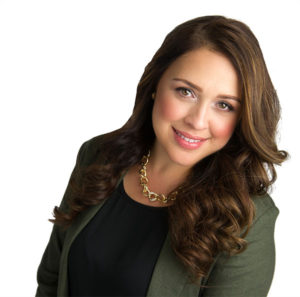 Automobile accidents are some of the most traumatic and expensive events that can happen in our modern world. What should you do if you are or ever end up in a major accident? You should follow these crucial steps to ensure your safety as well as the safety of anyone else that is involved in an auto accident. While it is recommended to follow the below list in order, there can always arise circumstances where you may skip specific steps, and this guide should be used as a reference only.
Automobile accidents are some of the most traumatic and expensive events that can happen in our modern world. What should you do if you are or ever end up in a major accident? You should follow these crucial steps to ensure your safety as well as the safety of anyone else that is involved in an auto accident. While it is recommended to follow the below list in order, there can always arise circumstances where you may skip specific steps, and this guide should be used as a reference only.
Immediately After The Accident
You should follow these three steps in the seconds and minutes following an accident. Quick reactions can save lives, time, and money.
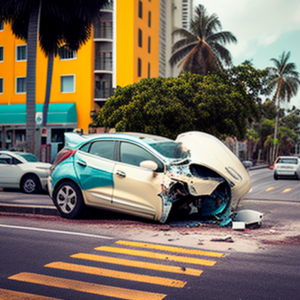 Step One: Check Yourself, Your Passengers, And Those In Vehicles Around You For Injuries
Step One: Check Yourself, Your Passengers, And Those In Vehicles Around You For Injuries
The adrenaline and shock of an auto accident can often cloud your vision or lessen the pain of injuries suffered in the event. It is imperative to check yourself and those in your immediate vicinity for any signs of harm.
First, check yourself for injuries and ask those in the vehicle if they can move, if they have any pain, and where they may be injured. If there is no response from a passenger, check them for consciousness. Do NOT move an unconscious person, as they could have injuries that are not immediately apparent. Further, if a person is conscious but in extreme pain, leave them still until emergency services arrive. Movement and improper first aid can do more harm than good and should be left to professional medical personnel.
Second, call for emergency services and nearby help immediately if someone is injured. The sooner an injury is treated, the greater chance of recovery. EMTs can offer life-saving treatment; you should call them to the scene of an accident without hesitation when you or others are wounded.
Third, listen to the instructions of a 911 dispatcher. Emergency responders and 911 operators are trained to assist in any way possible.
Step 2: Move Your Vehicles If Able And Get To Safety
If there are no injuries or your wounds are so minor that medical personnel can treat them later, you should move your cars as soon as possible. Do this step ONLY if your vehicle can be safely driven and is causing a road hazard. If your vehicle or another vehicle is too damaged to be removed from the road, get yourself and all passengers to a safe place and leave the vehicles to be towed. Seek out a nearby parking lot, open highway shoulder, or other open space where emergency services are not in traffic or causing road hazards.
Moving your vehicles out of the road will not only secure your safety but the safety of others. Depending upon where an accident occurs, oncoming drivers may not see or be able to react, causing further damage or harm. It is imperative to remove yourself and your vehicles from the scene quickly to prevent additional dangerous road conditions.
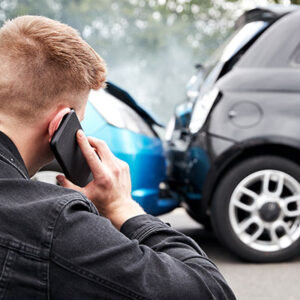 Step 3: Call The Authorities
Step 3: Call The Authorities
Whether there are injuries or not, you should call the police regardless of who is at fault in an accident. Minor, major, or somewhere in between, the severity or mildness of an accident should not dissuade you from alerting authorities. First responders have additional resources to assist in moving inoperable vehicles and securing road safety. Different reasons to call immediately are:
- Verification of all parties involved and the legal status of their vehicles
- Provides detailed information for future insurance claims, which can be crucial for aftercare and compensation
- Accurate descriptions of the accident and road conditions
- Photo and or video evidence if any party committed a crime
- Designation of the fault of which driver caused the accident
- Even if you feel you are at fault, you will need such a designation for insurance reporting
- Police can offer protection and security for injured parties
- Dispatching fire and ambulances can provide potentially life-saving care
- It is often the law for significant accidents and can help you avoid fees, fines, or liability for an accident
The only time you may want to avoid calling the authorities is if the accident is incredibly minor, there are no injuries, all vehicles can operate without loss of function, and all parties agree. However, this rare occurrence should not be seen as the norm. If you are in an accident and feel pressured by another driver NOT to call the police, it may be prudent to reach out to emergency services, even in the case of a minor crash.
Before You Depart The Scene Of An Accident
You should do the following steps after checking for injuries, ensuring a scene’s safety, and speaking with authorities. While these steps are less life-changing than the above, they are no less essential after an accident.
Step 4: Exchange Information With All Parties Involved
More than likely, following an accident, you will need to submit an insurance claim. Insurance companies, regardless of fault, will need other drivers’ names, insurance information, driver’s license, and plate numbers, as well as the make, model, and damage done to all involved vehicles. You can write such information down on a piece of paper, a note app, or in the best scenario, take a picture. You DO NOT want to commit such things to memory as writing it down or retelling information later will not be considered solid evidence, and you may be found at fault when the reality is different.
For the best-case scenario, please take a picture of the information and save it to a cloud service. Doing so will ensure that even if your phone is broken, lost, or stolen after the accident, you may access these crucial documents and notes anywhere that internet is available.
Step 5: Take Detailed Notes And Pictures Of Any Damage
While police may take photos of a crash for evidence, authorities may wait to share these with you or your insurance company. It is then prudent to take your own pictures of any damage to your vehicle and, if the other parties allow it, their cars as well. The more information you can provide for your insurance claim, in the case of undisputable photographs, the quicker it may be processed. Additionally, you can take notes on the damage, such as leaks, the vehicle’s odometer and warning lights, which can assist mechanics with repairs. If bystanders and witnesses are willing to share their information, try to gather as much as possible. It is an excellent practice to provide more information than needed to your insurance company. Finally, get a copy of the accident report. If you are still waiting for a copy, it can often be retrieved in the days after by contacting your local law enforcement agency.
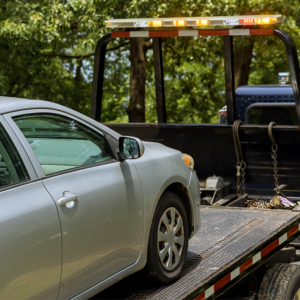 Step 6: Call A Tow Truck
Step 6: Call A Tow Truck
You may need to call a tow if you cannot safely move your vehicle due to damage or personal injuries. Depending upon the severity of the damage, you may also need a specialty towing company. Often, you can contact your insurance company to find any companies that are covered or to receive recommendations. Do NOT try to drive your car if it is severely damaged or has an excessively broken windshield. Doing so may cause yet another accident, and you can be found liable should your vehicle not be road safe following a collision.
Step 7: Go To The Hospital Or Urgent Care Facility
If you are sporting minor injuries, seeking medical care in the hours following an accident can save you future pain and possibly discover wounds you may not have immediately noticed. Regardless of how you feel, if you have suffered any head trauma, you should not drive yourself. Concussions are common injuries sustained after an auto accident and can lead to impaired driving or loss of consciousness. If you or one of your passengers suffers such an injury, medical assistance should be obtained as soon as possible.
In The Days Following An Accident
Depending upon the severity of an accident, more steps may be needed in the following days.
Step 8: Contact Your Insurance Company
While you can do this in the hours following an accident, you should contact your insurance company as soon as possible. Insurance providers will give information on what to do after providing all pertinent information. Additionally, they can offer recommendations on repair shops and coverage details. If your vehicle was totaled, where repair costs outweigh the car’s value, contacting your insurance is where you can secure a temporary rental or replacement vehicle.
Step 9: Contact Your Local DMV If Needed
Depending upon the severity of an accident, you may be required to contact the Department of Motor Vehicles or the local equivalent. Check your local DMV for guidelines on what you need to provide following an accident. Quickly reaching out to the DMV can save you time and money farther down the line, especially if authorities report any injuries after the fact.
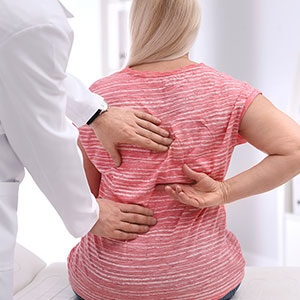 Step 10: Visit A Chiropractor
Step 10: Visit A Chiropractor
If you are involved in an auto accident, your musculoskeletal system will likely be affected the most. Even if you do not feel pain at the time of the accident, pain can develop over the next few days, so it will pay you to be proactive and book a chiropractic appointment as soon as possible. Chiropractic services after an accident can help with the following:
- Reduce swelling and pain in the neck and shoulder area
- Prevent scarring after an accident
- Assist with mobility and shorten recovery times
- Discover and treat injuries that you may not have noticed
- Medical referrals for attorneys and insurance claims
- Reduce healing times on musculoskeletal wounds such as whiplash
- Receive non-invasive treatment to possibly avoid costly surgery
Most chiropractors recommend scheduling appointments within the first 72 hours following an auto accident. As with all other tips in this guide, the sooner you act, the better. Putting off your treatment can cause permanent damage that you could have otherwise avoided.
Frequently Asked Questions
Will my insurance rates go up after an accident?
Depending upon who is at fault, your insurance premiums may rise. Some insurance companies offer a form of forgiveness for accidents. However, your rates may increase if authorities find you at fault for an accident. Even if you are the cause of an accident, you should not hesitate to report it to your insurance, as hiding or obfuscating information could lead to even more expensive litigation in the months and weeks following the incident.
What if the other driver is not insured?
You should see about uninsured driver coverage depending on your coverage. This type of coverage protects you in the event that the other driver doesn’t have proper or adequate insurance coverage in the event of an auto accident.
How to stay calm after an accident?
You may be experiencing shock, fear, and anxiety, and losing your calm can be potentially dangerous. First, take a few long breaths, ensuring your exhales are a few seconds longer than your inhalation. Note that you are alive and conscious and can take steps to improve your situation.
Should I visit a chiropractor after an accident, even if I have only minor injuries or soreness?
Yes, as outlined above, chiropractic services can restore function and mobility. While it may seem excessive for minor injuries, your health is a chiropractor’s main priority, and they can provide a customized health plan for you.
What should I do if the other driver is aggressive or pushing for authorities not to be called?
Get yourself to a safe place, preferably with witnesses, and call the police anyway. Additionally, avoid discussing fault with other drivers, as this is for the case’s investigators to decide.
Have you been involved in an auto accident in or around Miami, Florida?
Dr. Keren H. Gomez can help. She is an experienced chiropractic doctor who has helped countless people recover after an auto accident in Miami, FL. You can contact Dr. Gomez at one of her offices in Dade: 305-761-6528, Broward: 954-510-5518, Palm Beach: 561-414-2401, or online.

